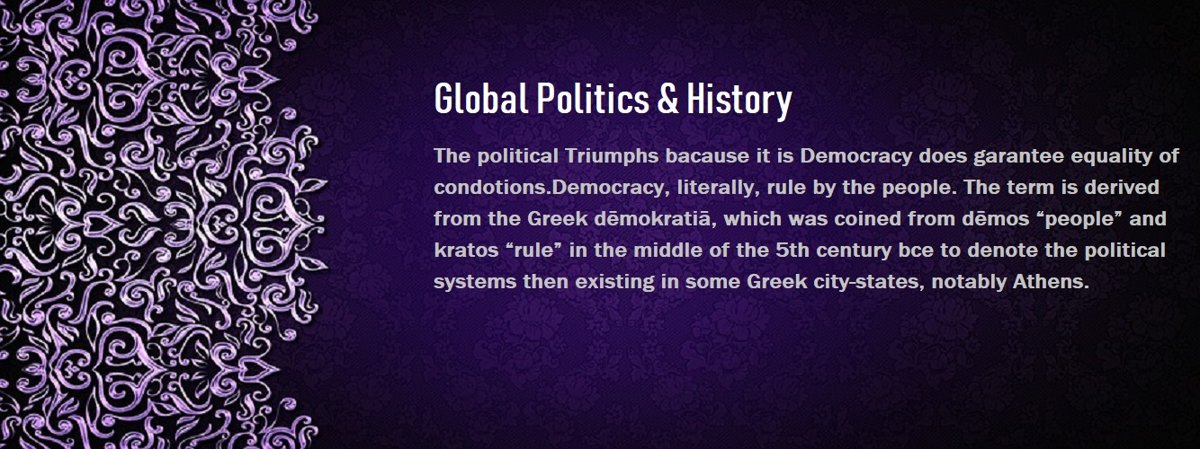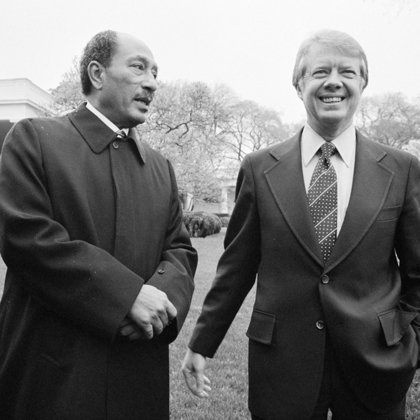EGYPT'S PRESIDENT ANWAR SADAT WAS ASSASSINATED ON OCTOBER 6,1981, BY MEMBER OF EGYPTIAN ISLAMIC JIHAD DURING THE ANNUAL PARADE IN CAIRO.PRESIDENT ANWAR SADAT AND ISRAELI PRIME MINISTER MENACHEM BEGIN HAVE GOT NOBEL PRICE IN 1978 AS PEACEMAKERS FOLLOWING THE 1978 CAMP DAVID ACCORDS.
The attack lasted about two minutes. Sadat and ten others were killed outright or suffered fatal wounds. Security forces were momentarily stunned but reacted within 45 seconds. One of the attackers was killed, and the three others injured and arrested. Sadat was airlifted to a military hospital, where eleven doctors operated on him. He died nearly two hours after he was taken to the hospital. Sadat’s death was attributed to “violent nervous shock and internal bleeding in the chest cavity, where the left lung and major blood vessels below it were torn”.In addition to Sadat, eleven others were killed, including the Cuban ambassador, an Omani general, a Coptic Orthodox bishop and Samir Helmy, the head of Egypt’s Central Auditing Agency (CAA). Twenty-eight were wounded, including Vice President Hosni Mubarak, Irish Defence Minister James Tully, and four US military liaison officers.In October 1981, President Sadat of Egypt was murdered by persons who were opposed to his policy of reconciliation with Israel and his close links with the United States. Sadat shared the Peace Prize with Israel's Prime Minister Begin after having taken the initiative in negotiating a peace treaty between the two countries. The so-called Camp David Accords came about thanks to the mediation efforts of US President Jimmy Carter.Anwar el-Sadat had military training. In World War II he fought against the British dominance of Egypt and was imprisoned for several years. After the war he joined the officers who under Nasser's leadership deposed the pro-English King Farouk in 1952.Nasser died a few years after Egypt's defeat by Israel in 1967, and Sadat took over as President. He broke Egypt's links with the Soviet Union, and sought US support in recovering territories lost to Israel. In the autumn of 1977 Sadat undertook a bold journey to Jerusalem, where he offered Begin a peace treaty in return for recovery of the occupied Sinai peninsula.Anwar Sadat (1918-1981) was Egypt's president from 1970 until his assassination. He launched a surprise attack on Israel in 1973, then became the first Arab leader to sign a peace treaty with Israel. He shifted from Soviet to American patronage and relaxed Egypt's internal economic and political system.Mohamed Anwar El-Sadat was born in 1918. His village, Mit Abul Kom, is about 40 miles north of Cairo in the Nile delta. Sadat lived with his grandmother while his father, a minor civil service clerk, was away in the Sudan with his Sudanese wife. The boy attended a village Quran (Moslem) school, then went briefly to a Coptic (Christian) school.His parents returned to Egypt in 1925, and Sadat went to live with them in Cairo. In later years he relished visits to his village and spoke nostalgically of his humble rural origins. Sadat's father struggled to support 13 children on his modest salary. Poor grades led Sadat to shift from government to private secondary schools on two occasions, but in 1936 he earned the coveted secondary school certificate.As a schoolboy, Sadat frequently demonstrated against the British, who occupied Egypt at that time. His heroes were all nationalists: Mahatma Gandhi, Adolf Hitler, Ataturk, and Egyptians Saad Zaghlul, Mustafa Kamil, and Mustafa Nahhas. He also admired a peasant martyr from Dinshaway (near Mit Abul Kom) whom the British had executed in 1906.One result of the 1936 treaty which Prime Minister Nahhas signed with the British was the opening of the military academy to lower middle class youths like Sadat and Gamal Abdel Nasser. Sadat graduated from the academy in 1938 and was posted to Manqabad in Upper Egypt. There he first met Nasser, a natural leader, serious and somewhat aloof. The idealistic young officers talked politics, debating the best way to rid their country of the British.In 1939 Sadat entered the Signal Corps. While Nasser was off in the Sudan, Sadat plotted direct action against the British. Occasionally he met with Hassan Al-Banna, the Supreme Guide of the Muslim Brotherhood, a group of religious zealots who wanted to root out Western and secular influences and turn Egypt into a theocracy.Axis forces based in Libya pushed into Egypt in 1941, hoping to seize the vital Suez Canal. In the following year the British arrested Sadat for plotting with two German spies who were living in a Nile houseboat and trying to send information to Rommel's army. Escaping from jail in October 1944, Sadat hid out until the end of the war made it safe for him to resurface. He then participated in an unsuccessful attempt on the life of former prime minister Nahhas, who had cooperated with the British during the war. Sadat's role in the killing of Amin Osman, an Anglophile politician, landed him back in jail in January 1946. Sadat's friendship with King Farouk's private doctor linked him to the Iron Guard, a secret palace organization which struck at the king's enemies.The trial of Sadat and others in the Amin Osman case was overshadowed by the outbreak of the 1948 Arab-Israeli war. The principal defendant escaped; Sadat and the others were acquitted and released. After dabbling in business schemes for a year or two Sadat won reinstatement in the army. He reestablished contact with Nasser's circle, who were now calling themselves "Free Officers" and planning to overthrow the corrupt and inept government. The riots of January 1952 destroyed foreign-owned businesses throughout Cairo and completed the public's disillusionment with the playboy king and the old politicians.Nasser summoned Sadat to Cairo from his post in Sinai on the evening of July 22, 1952. But finding no further message from his chief, Sadat took his family to the movies and nearly missed the coup. However, it was Sadat who broadcast the news of the coup to the public on the morning of July 23. King Farouk was sent into exile and Brigadier Mohamed Naguib served as the Free Officers' front man until Nasser broke with him and put him under house arrest in 1954.The posts Sadat held during the Nasser years were not quite at the center of power. He edited the regime's newspaper, al-Gumhuriya. He served as secretary-general of the Islamic Congress and of the National Union, the forerunner of the Arab Socialist Union and Egypt's only political party. During the 1960s he was speaker of the National Assembly. Sadat, along with Field Marshall Abdel Hakim Amer, bears much of the responsibility for Egypt's disastrous involvement in the Yemeni civil war (1962-1967). Then Egypt's defeat by Israel in the 1967 Six-Day War nearly destroyed Nasser's regime. Aware of his ill-health and of plots against him, Nasser named Sadat vice president at the end of 1969. Nicknamed "Major Yes-Yes" for his acquiescence to Nasser's wishes, Sadat had outlasted most of the other Free Officers who might have inherited the presidency.Nasser died of a heart attack on September 28, 1970. A plebiscite quickly confirmed Sadat as his successor. Ali Sabri and others in the Arab Socialist Union, the army, and the intelligence organizations assumed Sadat could soon be shouldered aside. ButSadat's "Corrective Revolution" of May 1971 sent the plotters to jail and consolidated his grip on power. A treaty of friendship reassured the nervous Soviets a few days later.Sadat liked to govern by surprises. In February 1971 he unexpectedly extended a ceasefire with the Israelis on the Suez front and announced plans to reopen the canal even though the enemy was entrenched on the opposite bank. Unable to obtain enough Soviet support for a military showdown and under increasing domestic pressure to act, Sadat pulled off another surprise in the summer of 1972. He expelled the numerous Soviet military advisers from Egypt.Failing to win American attention as he had hoped, Sadat now openly declared his intention to fight Israel. No one took him seriously, so the Syrian-Egyptian attack on October 6, 1973, came as a surprise. Egypt's successful crossing of the Suez Canal contrasted with the 1967 fiasco, but the Israeli counter crossing under General Sharon left Egyptian forces in a critical position by the time U.S. and Soviet intervention produced a ceasefire. Sadat always portrayed the Yom Kippur War as an unqualified victory, calling himself "The Hero of the Crossing."President Nixon and Henry Kissinger were paying attention at last. Sadat abandoned his Soviet option and risked all on Egyptian alignment with the United States. Kissinger's shuttle diplomacy produced limited Israeli pullbacks in Sinai in 1974 and 1975. Thereafter progress toward a settlement bogged down until Sadat's astonishing visit to Jerusalem in November 1977 to meet Prime Minister Menachem Begin and address the Knesset. President Jimmy Carter's personal diplomacy brought Begin and Sadat together at Camp David in September 1978. They signed two "framework" agreements, one providing for an Israeli-Egyptian peace treaty within three months, the other for a five-year transition toward autonomy and Palestinian self-government in the Israeli-occupied West Bank and Gaza Strip. Begin and Sadat signed the final treaty in March 1979, and they shared the Nobel Peace Prize for 1978. The Palestinian part of the agreement remained a dead letter, however, with Begin pursuing hardline policies toward the Palestinians and the other Arab states.
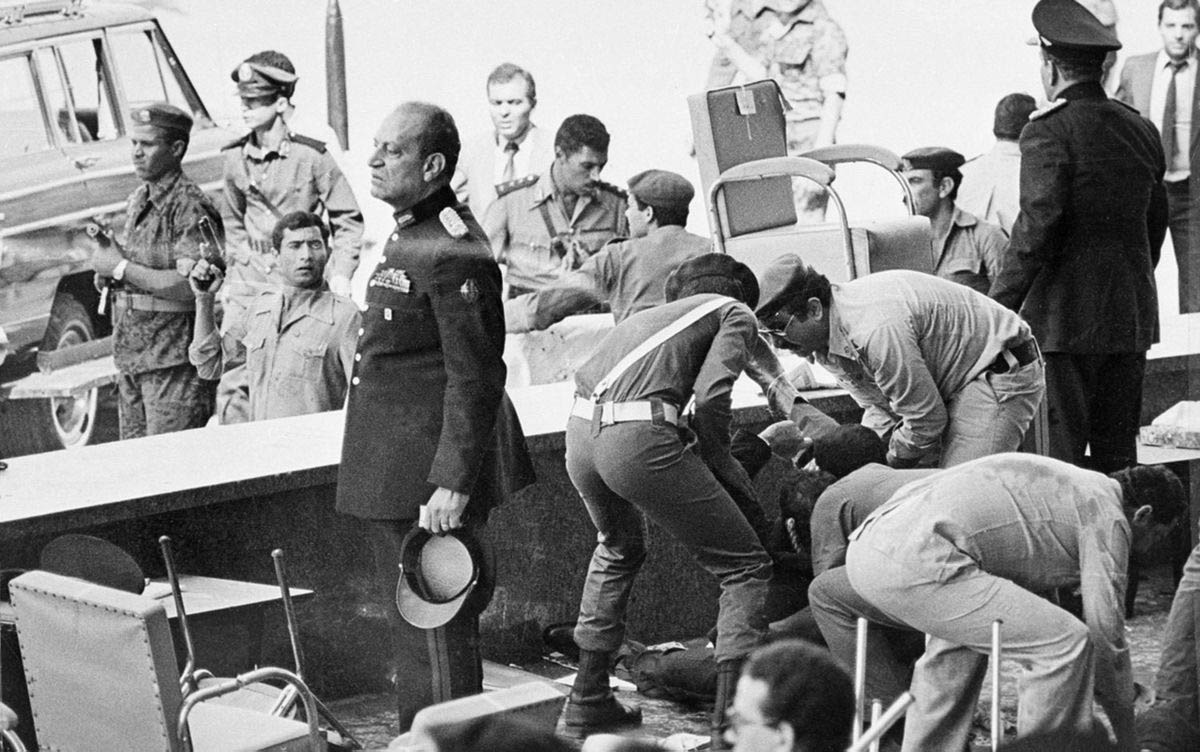
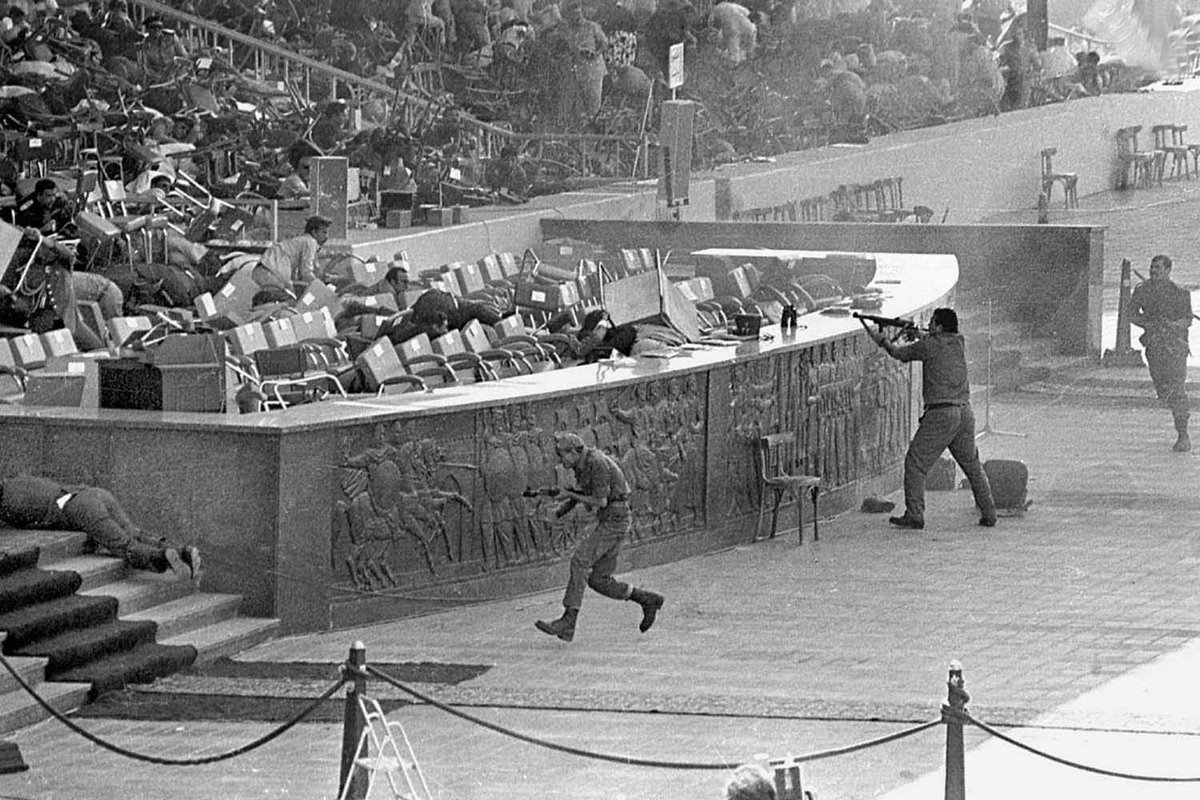 Egyptian soldiers tend to wounded after an attack on the reviewing platform which killed Egyptian President Anwar Sadat.The assassination was undertaken by members of the Egyptian Islamic Jihad. A fatwā approving the assassination had been obtained from Omar Abdel-Rahman, a cleric later convicted in the US for his role in the 1993 World Trade Center bombing. Islambouli and the other assassins were tried, found guilty, sentenced to death, and executed by firing squad in April 1982.
Egyptian soldiers tend to wounded after an attack on the reviewing platform which killed Egyptian President Anwar Sadat.The assassination was undertaken by members of the Egyptian Islamic Jihad. A fatwā approving the assassination had been obtained from Omar Abdel-Rahman, a cleric later convicted in the US for his role in the 1993 World Trade Center bombing. Islambouli and the other assassins were tried, found guilty, sentenced to death, and executed by firing squad in April 1982.Anwar Sadat became the third president of Egypt in 1970, after serving as vice president for President Gamal Abdel Nasser. The Egyptian army’s victory in the 1973 Yom Kippur War gave him the prestige to initiate major policy changes, from departing from Nasserism and launching the Infitah economic policy that encouraged private investments to reinstituting a multiparty system. Sadat stunned the Arab world when he visited Israel in 1977 to meet with Israel's then prime minister Menachem Begin and spoke before the Knesset (Parliament). The Egyptian president continued to pursue peace, and he engaged in negotiations with Israel. These culminated in the Egypt-Israel Peace Treaty, signed in Washington, D.C., on March 26, 1979, following the 1978 Camp David Accords.Sadat and Begin were jointly awarded the 1978 Nobel Peace Prize for their efforts. The treaty, however, was rejected by many in the Arab world, including the Muslim Brotherhood in Egypt, which felt that the president had abandoned efforts to ensure a Palestinian state. Sadat’s refusal to consult with other Arab nations before making a separate peace with Israel resulted in Egypt being suspended from the Arab League from 1979 to 1989. Tensions increased within Egypt as Islamists called for an overthrow of the president, and the country was marked by riots. Sadat ordered a major crackdown on opposition leaders after a failed military coup in June 1981.Egyptian and world dignitaries gathered in Cairo to commemorate the eighth anniversary of Egypt's crossing of the Suez Canal on October 6, 1981. As everyone was distracted by Egyptian Air Force Mirage jets flying overhead, an assassination squad got out of one of the troop trucks parading by and started shooting. Although he was protected by four layers of security and eight bodyguards, Sadat was killed. Ten other attendees died, and twenty-eight were wounded. The Egyptian president was buried in the Unknown Soldier Memorial in Cairo, and world leaders attended the funeral. The United States, which had actively worked with Sadat on a peace project for the Middle East, was represented by President Reagan, as well as former presidents Jimmy Carter, Gerald R. Ford, and Richard M. Nixon.In renaming the United Arab Republic the Arab Republic of Egypt, Sadat signaled his intention to put Egyptian interests ahead of the Pan-Arabism of the Nasser era. Nothing practical became of the Federation of Arab Republics (Egypt, Libya, and Syria), a scheme he had inherited. The impetuous young Gaddafi of Libya, who saw himself as Nasser's true heir, turned hostile and plotted to overthrow Sadat. In July 1977 open warfare flared for a time on the Libyan-Egyptian border.Syria, Jordan, Saudi Arabia, and the Palestinians saw the Camp David agreement as being made at Arab expense. Other Arab states agreed, and at an Arab League meeting in Baghdad the Arab states decided to withdraw their ambassadors from Egypt, sever political and economic ties, and move the headquarters of the league from Cairo to Tunis. The United States compensated somewhat for the loss of Egypt's Arab ties by massively increasing its aid to Sadat.The October 1973 war made Sadat his own man in economic policies and domestic politics as well as in foreign affairs. In 1974 he turned sharply toward economic liberalization, in contrast to the statist policies of Nasser. He proclaimed an "open door" economy, hoping it would attract private investment from Western, Arab, and Egyptian businessmen. He returned some of the lands and businesses nationalized under Nasser to their former owners. A new class of free-wheeling entrepreneurs quickly made fortunes in land speculation, luxury apartment construction, and consumer imports.So there were all sorts of unresolved questions and no sign of being able to even approach a solution to them, and an increasing unwillingness on the part of the Egyptians to make these kinds of decisions for the Palestinians. They wanted to just get some general principles agreed and have the elections take place and get Palestinians elected who were going to deal directly with the Israelis with a Jordanian presence as well if possible. Meanwhile there was a growing disillusionment internally in Egypt, the perception that peace had not produced all that they had anticipated, that Sadat had oversold the peace settlement in some ways to his public by promising economic miracles, and a quick solution to the Palestinian problem, that the isolation from the Arabs would be only temporary.Some came from the Islamic fundamentalists. He had given them a certain amount of freedom when he came into office. There was amnesty and he let out of jail a lot of the Muslim Brotherhood [symbol at left], who had been under lock and key during the Nasser period or underground, on the theory that they were the best defense against the Communists.He was more concerned about a threat that he perceived from the left, from the Communists. He saw communist conspiracies. And, of course, it turned out that he had let the genie out of the bottle. There were spin-offs of the Brotherhood, militant spin-offs, clandestine spin-offs, who definitely looked to violent political action as a way of trying to change the regime.Their objective was to achieve what Islamic fundamentalists basically had as their goal — to get the country back to the Koran, to make the Koran the law of the land, Islamic law and Islamic tradition, governing education, governing all aspects of society and all policies of the government. And that included not making peace with the infidel Israel, not being allied with the western devils, the United States, and certainly not allowing women in public life, like Mrs. Sadat who became a public figure in her own right. Mrs. Sadat was not the ideal of the Islamic wife, she was very public, and they had a rather elegant lifestyle as a family. The fundamentalists turned against him, because they wanted a regime that was run according to the precepts of the Koran, and he had, in fact, a secular regime.Many of Sadat’s friends were considered to be profiteering from the regime. There was clearly a lot of corruption, although Sadat personally I think was not involved, in that he never amassed a fortune, but he was tolerant of those who did. Their children married into some of the rich families that were tainted with corruption. There was an aura of corruption tarnishing the image of Sadat.The opposition was from the Islamic side, from the neo-Nasserists, those who regretted the end of the days of Nasser pan-Arabism, with Egypt the leader of the Arab world, and Arab socialism where you did not have the extremes of wealth that began to develop again under Sadat’s regime, which reminded a lot of people of the pre-Nasser period, of the monarchy, of the privileged classes. And Sadat did, in fact, turn back some of the properties of some of the wealthy people who had prospered under the monarchy whose property had been sequestered during the Nasser period.And then you had the old intellectuals, who had become disillusioned with Sadat very early on, when he proposed his treaty of peace with Israel, in effect unilaterally, without going along with the other Arabs. They weren’t opposed to the concept of ending the war, but they felt it should be in an Arab context and not a separate Egyptian context.And then there were opposition political parties. Sadat had permitted what had been a one-party state to be turned into a limited multi-party state. There was an authorized opposition, and it had a certain amount of credence and could speak against the government in parliament, and it included some people sympathetic to the Muslim Brothers who were not legally allowed to have political representation; it had people who were socialists, some neo-communists, some neo-Nasserists.A lot of the intellectuals of Egypt were writers and journalists, and many of them, under Sadat, were not allowed to publish. They had been allowed to join the al-Ahram Center for Strategic Studies, and it became a kind of think tank and a place where all of the disaffected intellectuals gathered and preached to each other about the ills of the regime, but they couldn’t get into print. There was definitely a limit on freedom of speech, freedom of expression.What Sadat did do was to do away with some of the extreme measures. He did away, in effect, with concentration camps, with most of the abuses infringing on civil rights. The judiciary became again to a larger extent an independent body of government. And people who felt they were abused by the regime had recourse to the courts. People were willing to talk in private… to express their views, and in most cases felt that they didn’t have to fear the arbitrary arrests or the knock on the door in the middle of the night or detention without trial.But there were exceptions. Occasionally, particularly when it came to dealing with some of the extremists in the Islamic movement, the niceties of law were not always observed. There were reports, and I guess continue to be reports of the brutality and tortures of the police interrogation methods. Most Egyptians however, even those who were critical of Sadat, will admit that the worst abuses, the police-state atmosphere of the latter Nasser period had been done away with. But, as I was saying, this was a period when Sadat’s image in the country had begun to lose its glow, and one got more and more intelligence reports of plots against the president’s life.Sadat had made sure that the military leaders were people who were loyal supporters. Sadat did not permit powerful subordinates. He did not permit anyone to develop any sort of power basis around him. So there were lots of people who were disaffected.The assassins’ bullets ended the life of a man who earned a reputation for making bold decisions in foreign affairs, a reputation based in large part on his decision in 1977 to journey to the camp of Egypt’s foe, Israel, to make peace. President Sadat was the first Arab leader to recognize the state of Israel since its creation in 1948. In September 1978, he met with Israeli Prime Minister Menachem Begin in the United States, where they negotiated a peace accord and, in 1979, a peace treaty. For their achievement, the leaders were awarded a joint Nobel Peace Prize. However, Sadat’s efforts were not so highly acclaimed in the Arab world. Arab states boycotted Egypt for breaking ranks and negotiating a separate treaty with Israel.On 6 October 1981, a victory parade was held in Cairo to commemorate the eighth anniversary of Egypt’s crossing of the Suez Canal. Sadat was protected by four layers of security and eight bodyguards, and the army parade should have been safe due to ammunition-seizure rules. As Egyptian Air Force Mirage jets flew overhead, distracting the crowd, Egyptian Army soldiers and troop trucks towing artillery paraded by. One truck contained the assassination squad, led by Lieutenant Khalid Islambouli. As it passed the tribune, Islambouli forced the driver at gunpoint to stop.
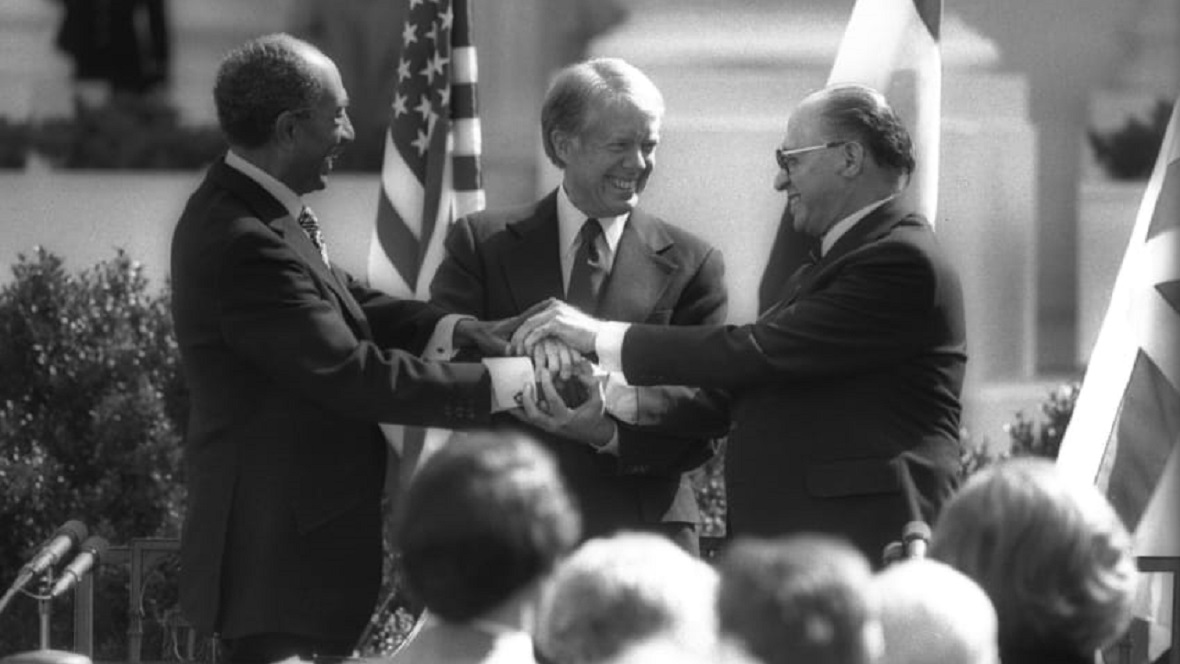 Anwar Sadat, former US president Jimmy Carter, and former prime minister Menachem Begin after signing the Egypt-Israel peace treaty in 1979.The Camp David Accords were signed by Egyptian President Anwar El Sadat and Israeli Prime Minister Menachem Begin on September 17, 1978, following twelve days of secret negotiations at Camp David.Before the Islamic revolution of Iran in 1979, the relationship between Cairo and Tehran was so friendly that the Shah of Iran, Mohammad Reza Pahlavi, called Sadat his “dear brother”.
Anwar Sadat, former US president Jimmy Carter, and former prime minister Menachem Begin after signing the Egypt-Israel peace treaty in 1979.The Camp David Accords were signed by Egyptian President Anwar El Sadat and Israeli Prime Minister Menachem Begin on September 17, 1978, following twelve days of secret negotiations at Camp David.Before the Islamic revolution of Iran in 1979, the relationship between Cairo and Tehran was so friendly that the Shah of Iran, Mohammad Reza Pahlavi, called Sadat his “dear brother”.
From there, the assassins dismounted and Islambouli approached Sadat with three hand grenades concealed under his helmet. Sadat stood to receive his salute. Anwar’s nephew Talaat El Sadat later said: “The president thought the killers were part of the show when they approached the stands firing, so he stood saluting them”. Islambouli threw all his grenades at Sadat, only one of which exploded (but fell short), and additional assassins rose from the truck, indiscriminately firing AK-47 assault rifles into the stands until they had exhausted their ammunition and then attempted to flee. After Sadat was hit and fell to the ground, people threw chairs around him to shield him from the hail of bullets.Egyptian soldiers tend to wounded after an attack on the reviewing platform which killed Egyptian President Anwar Sadat.The attack lasted about two minutes. Sadat and ten others were killed outright or suffered fatal wounds. Security forces were momentarily stunned but reacted within 45 seconds. One of the attackers was killed, and the three others injured and arrested. Sadat was airlifted to a military hospital, where eleven doctors operated on him. He died nearly two hours after he was taken to the hospital. Sadat’s death was attributed to “violent nervous shock and internal bleeding in the chest cavity, where the left lung and major blood vessels below it were torn”.In addition to Sadat, eleven others were killed, including the Cuban ambassador, an Omani general, a Coptic Orthodox bishop and Samir Helmy, the head of Egypt’s Central Auditing Agency (CAA). Twenty-eight were wounded, including Vice President Hosni Mubarak, Irish Defence Minister James Tully, and four US military liaison officers.The assassination was undertaken by members of the Egyptian Islamic Jihad. A fatwā approving the assassination had been obtained from Omar Abdel-Rahman, a cleric later convicted in the US for his role in the 1993 World Trade Center bombing. Islambouli and the other assassins were tried, found guilty, sentenced to death, and executed by firing squad in April 1982.Sadat also planned his political liberalization with American audiences in mind. Abandoning Nasser's singleparty system, he encouraged "left" and "right" splinters to break off from the Arab Socialist Union's "center" in 1976. He made sure, however, that his own center party (called the National Democratic Party since 1978) kept over-whelming control in the People's Assembly. Manipulation of the laws and government harassment kept the Progressive Unionist left, the New Wafd right, and the religious purists from mounting all-out public challenges to the regime.Even before the signing of the treaty with Israel, the early hopes for the Sadat era were fading inside Egypt. The "open door" had brought in foreign banks, tourism, and luxury imports, and it had encouraged many Egyptians to earn quick fortunes in Egypt's oil-rich Arab neighboring countries. But there was little investment in productive industries. A contractor named Osman Ahmad Osman, whose son had married one of Sadat's daughters, came to symbolize the nepotism and opportunism of the new rich whom the public labeled "fat cats." Student and worker opposition flared into full-scale riots in January 1977 when the government, acting under pressure from the International Monetary Fund, cut back the food subsidies which cushioned poverty for the average Egyptian.The lifestyle of Sadat and his wife Jihan also aroused concern. Sadat divorced his rustic first wife on emerging from prison in 1948. His new wife, Jihan, was half-British, good looking, and considerably younger than himself. The couple developed a taste for the good life, ordering clothes from Paris designers. Sadat's first wife had followed Middle Eastern custom by remaining in the background, but Jihan enjoyed the limelight. She spoke up for women's rights, visited hospitals, and presided at official ceremonies. Reporters abroad were delighted with the couple's Western manner and their ready accessibility for interviews. Many Egyptians were not.In his last years the Islamic religious groups which he had at first encouraged to balance off other opponents came back to haunt Sadat. The Muslim Brotherhood and its more radical offshoots deplored the Westernization and corruption of Egyptian public life. They opposed the treaty with Israel. The example of the Iranian revolution of 1979 and their own dismal career prospects also turned educated urban youths to fundamentalist Islamic groups in large numbers. The fears of the Coptic minority mounted simultaneously, and violence between Christians and Muslims broke out on several occasions.In September 1981 Sadat struck out wildly at his diverse opponents. He arrested hundreds of politicians of all stripes, banned journals, stripped the Coptic Pope of his temporal power over his community, and expelled the Soviet ambassador.Sadat had lost his political touch. On October 6, 1981, Muslim religious radicals shot him down as he reviewed a military parade commemorating the 1973 war. The shocked West paid tribute to Sadat by dispatching three former U.S. presidents and other prominent statesmen to his funeral. Prime Minister Begin also attended. Egyptians and Arabs reacted differently. The streets of Cairo, which millions of mourners had jammed when Nasser died, remained eerily silent. Anyway, to get back to the main theme. Sadat was getting increasingly authoritarian and, some people would say, rather erratic, and over-reacting to some reports of criticism he heard, the gossip that they kept bringing to him. He was getting out of touch with the people he should have been listening to.When he came back (from Washington), one day he simply rounded up all the people who had ever been critical of him from extremists on the Muslim Brotherhood side to people like Heikal. Heikal was not a threat to him. He had them all rounded up and put in jail for awhile to give them a lesson.He also at the same time moved against the Coptic pope, the head of the Coptic Church. In any case, Sadat, in effect, exiled the pope, put the pope in a monastery in the desert and appointed a group of bishops to run the affairs of the church.Working with Nasser Sadat learned the dangerous game of nationbuilding in a world of superpower rivalries. Egypt eventually became the leading "non-aligned" country in the world, giving a voice, through Nasser, to the desires of the undeveloped and post-colonial societies. Their most important trial came over the Suez Canal, which Nasser nationalized in 1956. In a coordinated effort, the British, French, and the new nation of Israel launched an attack on Egypt hoping to reestablish colonial control over the Canal and its profits. The 1956 war ended only after the United States pressured its allies to withdraw. Egypt emerged from the war a hero of the non-alligned countries, having successfully resisted colonial powers and maintained its control of the Suez.Nasser's prominence suffered greatly from the debacle of the Six Day War. In it, the Israeli military completely destroyed the Egyptian air forces (mostly caught unawares on the ground) and swept through the Sinai to the Suez Canal routing the Egyptian army, killing at least 3,000 soldiers. The devastation also threatened to bankrupt the government. Internal squabbling among Arab nations and the growing Palestinian movement eventually strained Nasser's abilities to the limit. Under the strain, Nasser collapsed and died on 29 September 1970.When he succeeded Nasser, Sadat was completely unknown and untested. Over the next 11 years, however, Sadat proved his leadership abilities. His first trial on the international scene involved the aftermath of the Six Days War. Sadat openly offered the Israelis a peace treaty in exchange for the return of the Siani lands taken in the attack.Domestic crisis and international intrique presented Sadat with seemingly insurmountable problems. The Egyptian economy continued to real from war with Israel and the Egyptian's continuing relationship with the Soviet Union deteriorated as the Soviet's proved unreliable allies. When pressed for more military support to replace the devastation of the Six Days War, the Soviets simply ignored Sadat's requests. In a bold move, which soon became his trademark, Sadat expelled the Soviets. This grand gesture solidified Egyptian internal support at a time when the average Egyptian suffered greatly.Behind the scenes, however, Sadat plotted to retake the Egyptian Siani if the Israelis continued to refuse the Egyptian peace initiative. On 6 October 1973, Sadat struck. With exceptional military precision, the Egyptian army crossed the Suez back into the Sinai and began driving the Israeli army into the desert. Though short-lived, the attack created a new momentum for peace both in Egypt and in Israel. These pressures coincided with continued domestic problems in Egypt.The deteriorating economy in Egypt, accomplanied by a growing distance between rich and poor, led to internal strife, riots, strikes, attacks on the rich. These internal pressures raised the attention of the international community, particularly the United States, concerned that internal strife would weaken Sadat's moderate policies.Convinced that peace with Israel would reap an enormous "peace dividend," Sadat initiated his most important diplomatic ploy. In a speach to the Egyptian parliament in 1977, Sadat affirmed his desire to go anywhere to negotiate a peace with the Israelis. Even, he affirmed, he would go to the Israeli parliament to speak for peace. The Israeli's responded with an invitation to do just that and Sadat's speech to the Israeli Knesset initiated a new momentum for peace that would eventually culminate in the 1978 Camp David Accords and a final peace treaty with Israel in 1979.
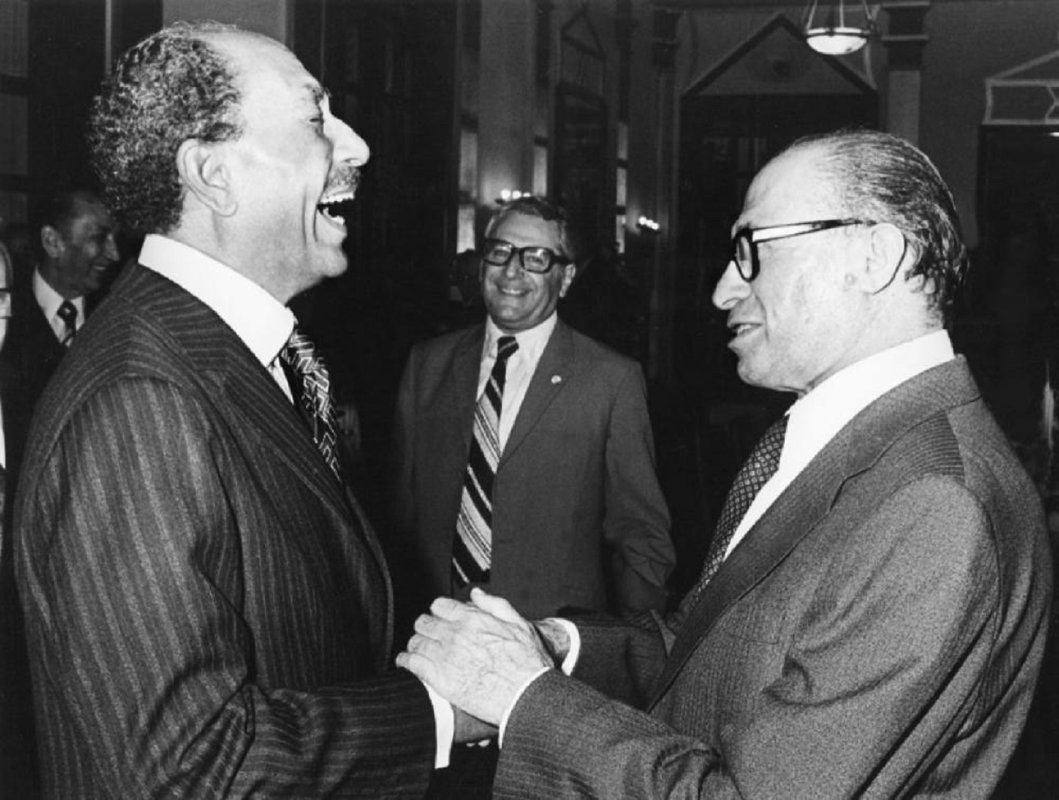 Egyptian President Anwar Sadat and Israeli Prime Minister Menachem Begin are jointly awarded the 1978 Nobel Peace Prize for their efforts in bringing about peace between Israel and Egypt. The award would be presented in a ceremony on December 10, 1978.The announcement of the award came a little over a month after the conclusion of the Camp David talks, which had laid a foundation for the March 1979 Peace Treaty between the two countries. Some observers believe that the awarding of the prize to Begin and Sadat, before a peace treaty was formally signed, was insurance to make sure that the two leaders did in fact go forward with the talks and conclude them with a treaty.
Egyptian President Anwar Sadat and Israeli Prime Minister Menachem Begin are jointly awarded the 1978 Nobel Peace Prize for their efforts in bringing about peace between Israel and Egypt. The award would be presented in a ceremony on December 10, 1978.The announcement of the award came a little over a month after the conclusion of the Camp David talks, which had laid a foundation for the March 1979 Peace Treaty between the two countries. Some observers believe that the awarding of the prize to Begin and Sadat, before a peace treaty was formally signed, was insurance to make sure that the two leaders did in fact go forward with the talks and conclude them with a treaty.
